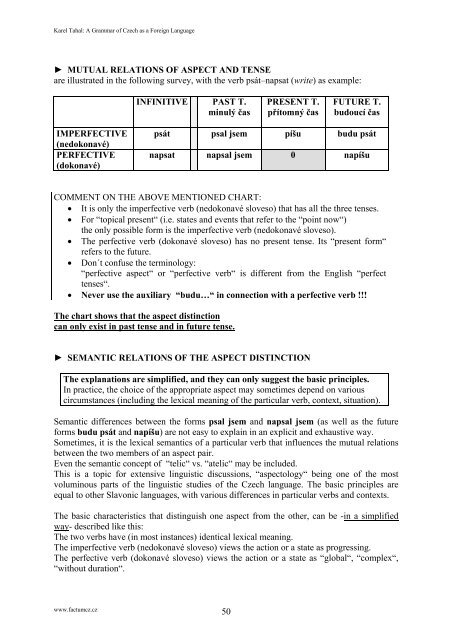A GRAMMAR OF CZECH AS A FOREIGN LANGUAGE Karel Tahal
A GRAMMAR OF CZECH AS A FOREIGN LANGUAGE Karel Tahal
A GRAMMAR OF CZECH AS A FOREIGN LANGUAGE Karel Tahal
Create successful ePaper yourself
Turn your PDF publications into a flip-book with our unique Google optimized e-Paper software.
<strong>Karel</strong> <strong>Tahal</strong>: A Grammar of Czech as a Foreign Language<br />
► MUTUAL RELATIONS <strong>OF</strong> <strong>AS</strong>PECT AND TENSE<br />
are illustrated in the following survey, with the verb psát–napsat (write) as example:<br />
INFINITIVE P<strong>AS</strong>T T.<br />
minulý čas<br />
PRESENT T.<br />
přítomný čas<br />
FUTURE T.<br />
budoucí čas<br />
IMPERFECTIVE<br />
(nedokonavé)<br />
PERFECTIVE<br />
(dokonavé)<br />
psát psal jsem píšu budu psát<br />
napsat napsal jsem 0 napíšu<br />
COMMENT ON THE ABOVE MENTIONED CHART:<br />
• It is only the imperfective verb (nedokonavé sloveso) that has all the three tenses.<br />
• For “topical present“ (i.e. states and events that refer to the “point now“)<br />
the only possible form is the imperfective verb (nedokonavé sloveso).<br />
• The perfective verb (dokonavé sloveso) has no present tense. Its “present form“<br />
refers to the future.<br />
• Don´t confuse the terminology:<br />
“perfective aspect“ or “perfective verb“ is different from the English “perfect<br />
tenses“.<br />
• Never use the auxiliary “budu…“ in connection with a perfective verb !!!<br />
The chart shows that the aspect distinction<br />
can only exist in past tense and in future tense.<br />
► SEMANTIC RELATIONS <strong>OF</strong> THE <strong>AS</strong>PECT DISTINCTION<br />
The explanations are simplified, and they can only suggest the basic principles.<br />
In practice, the choice of the appropriate aspect may sometimes depend on various<br />
circumstances (including the lexical meaning of the particular verb, context, situation).<br />
Semantic differences between the forms psal jsem and napsal jsem (as well as the future<br />
forms budu psát and napíšu) are not easy to explain in an explicit and exhaustive way.<br />
Sometimes, it is the lexical semantics of a particular verb that influences the mutual relations<br />
between the two members of an aspect pair.<br />
Even the semantic concept of “telic“ vs. “atelic“ may be included.<br />
This is a topic for extensive linguistic discussions, “aspectology“ being one of the most<br />
voluminous parts of the linguistic studies of the Czech language. The basic principles are<br />
equal to other Slavonic languages, with various differences in particular verbs and contexts.<br />
The basic characteristics that distinguish one aspect from the other, can be -in a simplified<br />
way- described like this:<br />
The two verbs have (in most instances) identical lexical meaning.<br />
The imperfective verb (nedokonavé sloveso) views the action or a state as progressing.<br />
The perfective verb (dokonavé sloveso) views the action or a state as “global“, “complex“,<br />
“without duration“.<br />
www.factumcz.cz<br />
50



